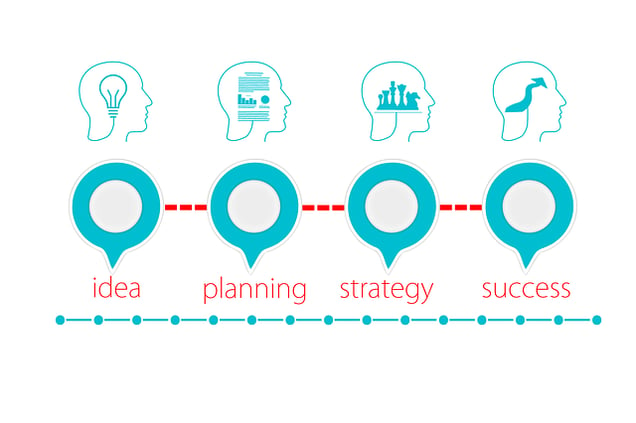
Think about this: Strategy is defined as, "a plan of action or policy designed to achieve a major or overall aim." What is your overall aim for your small business? Taking a look at your big picture is a key component in both your short and long-term success. Creating and following a business strategy at any stage of your business is important for success because it outlines how you will accomplish your business goals.
We always refer to a business plan as a dynamic tool (strategy) to help you guide and grow your business. Let's set a course for smooth sailing, prepare for unexpected storms, and have a written strategy to lead us to a successful future, no matter what size of business you have.
Have you looked at your business plan lately? Do you have a business strategy in place? Take a look at the following questions that you need to answer to help you develop a strategy to take your business to the next level.
What are your mission and vision statements?
The mission and vision statement mean different things but work together. They provide everyone, including you a shared path to where you are now and where you want to go in the future. Your mission statement explains the overall purpose of your business. Your vision statement is like a look into the future and shares how you see the company down the road.
What is your unique selling proposition?
Knowing your industry and understanding your competition will help you create your unique selling proposition or competitive advantage. What makes you stand out? Why do customers want, need, and come to you instead of another business that has similar products or services? This can be your price, customer service, product quality, etc. When you know this, it becomes a major strength in your business and marketing strategy.
Who are your customers and your target market?
Even though we want to be everything for everyone, defining your target audience will help you achieve your strategic goals. What niche audiences are you helping? What are their ages? What are their likes and dislikes? How do they shop? Where do they work, live, and play? What is their income level? What problems can you solve for them? When you know your target audience it is easier to create marketing and sales campaigns that speak directly to them.
What are your long-term goals?
Thinking long-term will help you see the future more vividly. Strong leaders understand that delegating the day-to-day operations will allow them to focus on future growth, how to pivot in the event of a market disruption, keep an eye on the competition, market trends, and other important business decisions. Writing long-term goals down keeps everyone in the organization in the loop and becomes part of the exciting future ahead.
Do you measure and record your results?
Knowing what worked and didn't work is instrumental in adjusting your future strategy. Measuring, analyzing, and most importantly documenting what worked and didn't work is priceless. Make this process part of your strategy for short and long-term decision-making.
Creating a business strategy may seem unnecessary if you’re a small business owner, especially if you’re already doing well, but if you don’t have a written strategy for how you will grow your business, how can your business grow? Don’t just wing your business strategy - Contact us today to learn how to implement a successful business strategy to help take your business to the next level!
Contact Infix
Don’t just wing your business strategy - Contact us today to learn how to implement a successful business strategy to help take your business to the next level! Ask us about this in your free 30-minute virtual coaching session. Just contact us at 949-484-6349 or fill out our online form.





